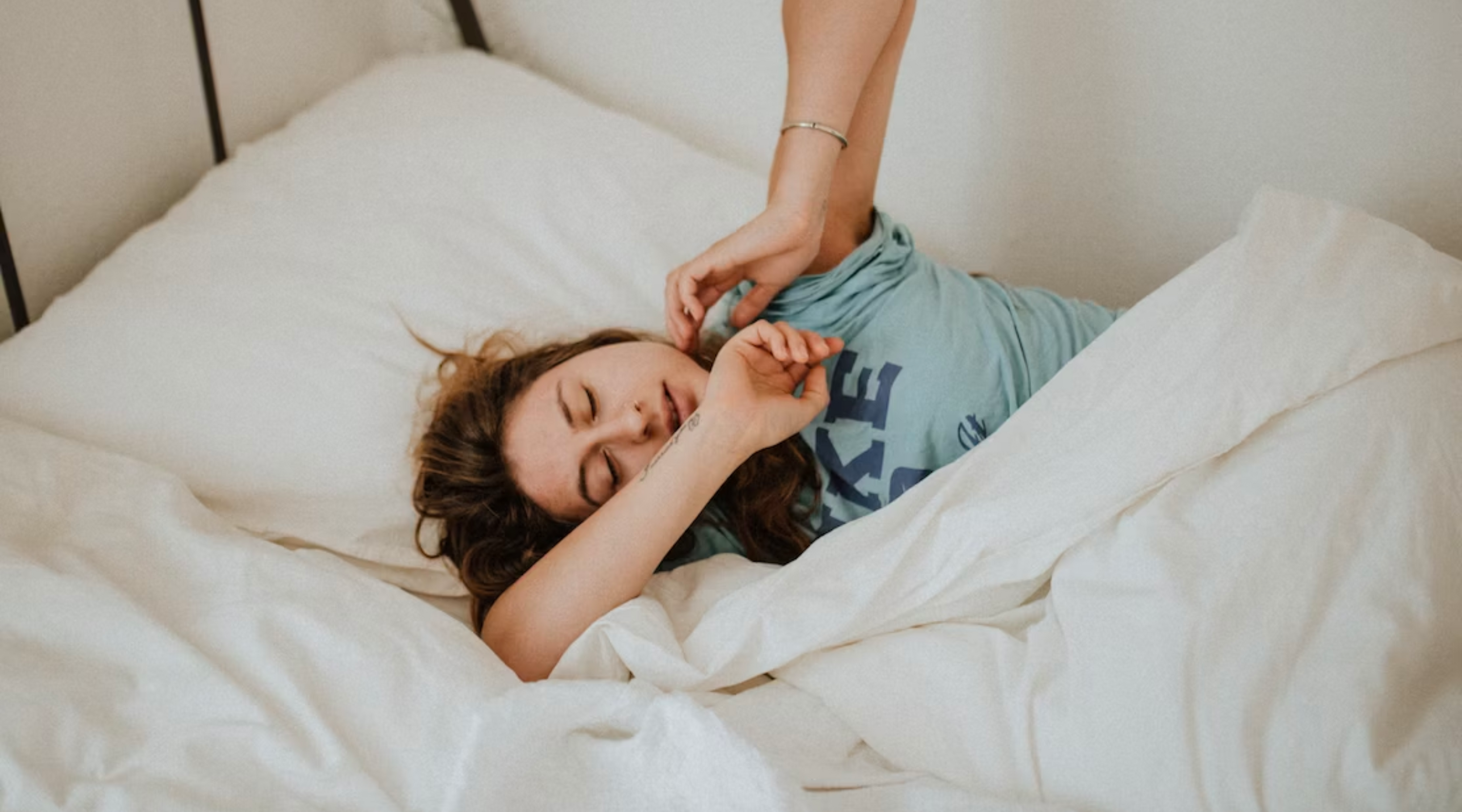Eczema, is a chronic skin condition that affects millions of people worldwide. While it can be a challenging condition to manage throughout the day, the discomfort and itchiness associated with eczema can make it particularly difficult to get a good night's sleep. In this blog post, we will explore why sleeping with eczema can be challenging and provide you with six valuable tips to help you achieve better sleep and wake up feeling refreshed.
The Challenges of Sleeping with Eczema
Discomfort: The dry, inflamed, and sensitive skin associated with eczema can cause discomfort when in contact with bedding materials or when exposed to temperature changes. This discomfort can lead to restlessness and disturbed sleep.
Nighttime scratching: The urge to scratch affected areas is often irresistible, especially when the itchiness intensifies during the night. The warmth of the bed, friction from the sheets, and even sweat can trigger itching, making it difficult to fall asleep or stay asleep throughout the night. Scratching can provide momentary relief but can also worsen the condition, leading to more inflammation, infections, and disturbed sleep.
Create a Soothing Bedtime Routine
Establishing a relaxing bedtime routine can help signal to your body and mind that it's time to unwind and prepare for sleep. Here are a few suggestions for a soothing routine:
Gentle cleansing: Take a lukewarm bath or shower using mild, fragrance-free products, such as the Grahams Natural Intensive Therapy Body Wash or Body & Bath Oil to cleanse the skin without drying it out further. Avoid hot water, as it can strip the skin of its natural oils and exacerbate eczema symptoms.
Moisturise before bed: Apply a generous layer of a gentle, hypoallergenic moisturiser, such as the Grahams Natural C+ Eczema & Dermatitis Cream to help lock in moisture and soothe the skin. This cream contains naturally hydrating ingredients, including Manuka Honey, Calendula and Gotu Kola, which work together to provide maximum relief from itching, dryness, redness and inflammation.
Wear breathable sleepwear: Opt for loose-fitting, breathable cotton sleepwear to minimise friction and irritation against your skin. Avoid synthetic fabrics that can trap heat and moisture, worsening eczema symptoms.
Bedtime relaxation techniques: Engage in calming activities before bed, such as reading a book, practicing gentle stretching or yoga, or listening to soothing music. These activities can help relax your mind and prepare your body for sleep.
Optimise Your Sleep Environment
Creating a comfortable sleep environment can significantly improve the quality of your sleep, even with eczema. Consider the following tips:
Maintain a cool room temperature: Keep your bedroom cool and well-ventilated to prevent excessive sweating, which can trigger eczema flare-ups. Use a fan or air conditioning if necessary.
Invest in hypoallergenic bedding: Choose hypoallergenic, dust mite-resistant bedding made from natural fibers like cotton or bamboo. Wash your sheets and pillowcases regularly with fragrance-free, mild detergents.
Use a humidifier: Dry air can worsen eczema symptoms, so using a humidifier can help add moisture to the air and prevent excessive skin dryness. Clean the humidifier regularly to avoid mold and bacteria buildup.
Reduce allergens: Dust mites, pet dander, and other allergens can worsen eczema symptoms. Keep your bedroom clean and free from dust, vacuum regularly, and consider using allergen-proof covers for your mattress and pillows.
Minimise blue light exposure: Blue light emitted by electronic devices, such as smartphones, tablets and computers, can interfere with your sleep patterns. Exposure to blue light in the evening can suppress the production of melatonin, a hormone that regulates sleep-wake cycles. To promote better sleep, consider implementing the following:
-
Establish a digital curfew: Set a specific time, preferably one to two hours before bed, to disconnect from electronic devices. Use this time to engage in relaxing activities like reading a book or practicing a calming bedtime routine.
-
Use blue light filters: Many devices offer settings that reduce blue light emissions. Enable the "night mode" or "blue light filter" on your devices, which automatically adjusts the color temperature to reduce the stimulating effects of blue light.
-
Dim the lights: In the hours leading up to bedtime, dim the lights in your home to signal to your body that it's time to wind down. Consider using warm, soft lighting instead of bright, harsh lights, which can help create a more soothing environment.
Manage Itchiness and Irritation
Reducing itchiness and irritation is crucial for achieving better sleep with eczema. Try the following tips:
Avoid triggers: Identify and avoid triggers that worsen your eczema symptoms, such as certain fabrics, harsh detergents or allergens. Keep a diary to track potential triggers and make necessary adjustments to your lifestyle and environment.
Cool compresses: Apply cool, damp compresses to itchy areas before bed to help alleviate itchiness and inflammation. Ensure the compresses are not too cold to avoid temperature-related discomfort.
Recommended products: Consider using gentle and effective products specifically formulated for eczema-prone skin, such as those offered by Graham's Natural. Graham's Natural offers a range of natural and nourishing products that can help manage eczema symptoms and promote better sleep.
-
C+ Eczema Cream: is specially formulated with natural ingredients like colloidal oatmeal, calendula & manuka honey. It helps soothe itchiness, reduce inflammation, nourish the skin, ultimately providing relief for symptoms. Apply the cream to affected areas before bedtime for targeted relief.
-
Body & Bath Oil: is an excellent addition to your bedtime routine. Add a few drops to your bathwater and allow the naturally hydrating oils to moisturise and calm the skin. The gentle formula helps relieve itching and soothes irritated skin, preparing you for a more peaceful sleep.
Anticipatory scratching management: Keep your nails short and smooth to minimise skin damage from scratching. You can also consider wearing cotton gloves or covering affected areas with soft bandages or clothing to prevent direct contact and reduce scratching.
Wet wrapping: Wet wrapping is a technique that can provide intensive moisture and relief for severe eczema flare-ups, especially during the night. It involves applying a layer of moisturiser to the affected areas and then covering them with damp bandages or clothing. This technique helps lock in moisture, soothe the skin, reduce inflammation & itchiness, by improving the absorption of moisturisers into the skin.
Here's how to perform wet wrapping:
-
Take a lukewarm bath or shower to cleanse your skin and pat it dry gently.
-
Apply a generous layer of a gentle of the C+ Eczema Cream, to the affected areas.
-
Soak bandages or clothing in lukewarm water and wring out the excess moisture. The dampness helps enhance the moisturising effect.
-
Carefully wrap the damp bandages or dress in damp clothing over the moisturised areas, then follow with cling wrap over the top. Make sure it's not too tight to restrict circulation or too loose to prevent the bandages from staying in place.
-
Leave the wet wraps on for a few hours or overnight.
Practice Stress Reduction Techniques
Stress can exacerbate eczema symptoms and disrupt your sleep patterns. Implementing stress reduction techniques can help promote better sleep:
Relaxation exercises: Engage in calming activities before bed, such as deep breathing, meditation or gentle stretching. These techniques can help relax your body and mind, preparing you for a more restful sleep.
Be social and laugh: Spending time with friend & family and engaging in social activities can be a great stress reliever. Laughing with friends and family can boost your mood and reduce stress levels. Plan outings or gatherings that bring you joy and allow you to connect with others.
Get active: Physical activity is an effective way to reduce stress and improve sleep quality. Engaging in regular exercise releases endorphins, which are natural mood boosters. Find activities that you enjoy and that suit your fitness level. This could be going for a walk or jog outdoors to enjoy nature, practicing yoga or pilates for relaxation and flexibility, engaging in strength training to build muscle and release tension, or participating in cardio exercises for a heart-pumping workout.
Practice mindfulness: Mindfulness techniques can help you stay present, reduce stress, and improve sleep. Consider incorporating mindfulness meditation or guided imagery exercises into your daily routine. These practices can help you focus on the present moment, promote relaxation, and alleviate anxiety.
Express yourself creatively: Engaging in creative outlets can be a therapeutic way to reduce stress. Consider activities like painting, drawing, writing or playing a musical instrument. These creative endeavors provide an opportunity for self-expression and can help shift your focus away from stressors.
Prioritise self-care: Taking care of your physical and emotional well-being is essential for managing stress. Engage in activities that bring you joy and relaxation, such as taking a warm bath, practicing self-massage or indulging in a hobby. Prioritising self-care shows yourself kindness and helps reduce stress levels.
If eczema significantly impacts your sleep quality or persists despite your efforts, it is essential to consult a healthcare professional. They can provide a comprehensive evaluation of your condition and recommend suitable treatment options
Sleeping with eczema can be challenging due to itchiness, discomfort and the irresistible urge to scratch. However, by implementing these tips, you can improve your sleep quality and wake up feeling more rested. Remember to establish a soothing bedtime routine, optimise your sleep environment, manage itchiness, practice stress reduction techniques and seek professional advice when necessary. With the right strategies and consistent self-care, you can minimise the impact of eczema on your sleep and overall well-being.
By prioritising your sleep and taking proactive steps to manage your eczema, you can create a restful environment that promotes healing and rejuvenation. Sleep is essential for overall health and well-being, and with these tips, you can enhance the quality of your sleep and wake up feeling refreshed and ready to take on the day.





